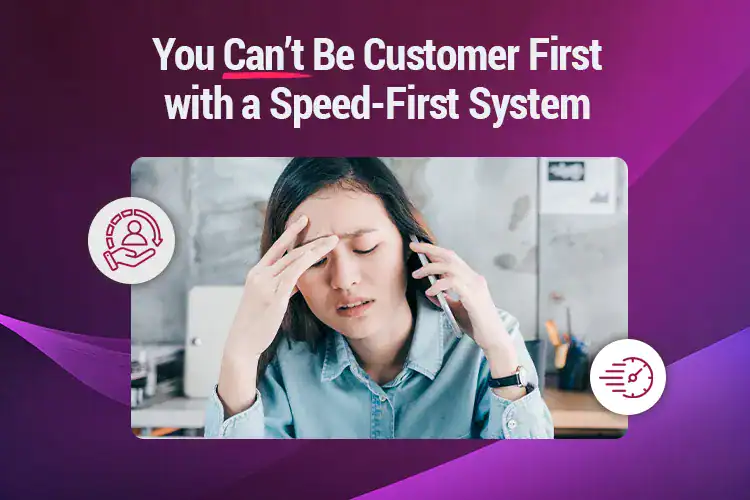If your support agents are told to keep calls under three minutes—but still deliver excellent service—something’s going to give. And more often than not, it’s the customer experience. You can’t preach “customer-first” while managing your team with stopwatch metrics. Because when your KPIs value speed above substance, the conversation shifts from solving problems to shaving seconds. And customers notice.
When fast becomes the goal instead of effective, your brand may be moving quickly—just in the wrong direction.
- Speed-Driven Metrics Undermine Support Quality: Prioritizing call handle times over meaningful resolution erodes trust and drives repeat tickets.
- Agents Need Permission to Slow Down: Empowering agents with autonomy and unified tools lets them listen deeply, ask the right questions, and truly solve issues.
- Customer Confidence Trumps Call Length: Post-call CSAT, sentiment scoring, and first-contact resolution reveal satisfaction more accurately than raw speed metrics.
- Omnichannel Platforms Unite Support Touchpoints: Solutions like NobelBiz Omni+ streamline workflows across SMS, voice, and chat, reducing friction and improving consistency.
- True Efficiency Is Outcome-Focused: Redefining efficiency around clarity and customer satisfaction fosters loyalty, not just shorter handle times.
💡When Fast Becomes a Barrier to Quality – speed vs quality support
The pressure to handle calls faster may look good in reports, but it often backfires in the real world of support. Customers don’t judge you by call duration—they judge you by how you made them feel and whether their issue was resolved. And when speed becomes the driving force, quality tends to take a back seat.
54% of consumers say they have higher expectations for customer service teams than one year ago.
⚠️The obsession with handle time
Let’s be honest: short calls make dashboards look great. But many of those quick conversations come at the cost of depth. Customers who are rushed through support often leave without real clarity—and without the confidence that they were truly helped. Handle time alone doesn’t capture the whole picture. It can’t tell you if the customer got off the phone satisfied or confused.
“Speed is important, but not at the expense of understanding. True efficiency is resolving the issue right the first time.”– Mike Mcguire, Chief Revenue Officer at NobleBiz
🔥The stress it puts on your contact center agents
Agents feel it too. They’re asked to show empathy, build rapport, and hit rigid time targets—often all at once. And when speed is prioritized above all else, agents default to shortcuts. Not because they don’t care, but because the system tells them to hurry up. That’s not just exhausting—it’s demoralizing.
Shortcuts forced by speed metrics
Speed-focused systems lead to:
- deflection
- transferring calls unnecessarily
- skipping context
- offering quick fixes instead of full solutions.
It’s not that agents are lazy—it’s that they’re trained to survive in a system that rewards speed over resolution. The result? A revolving door of unresolved tickets, repeat calls, and eroding trust.
Salman Aslam
Director Support – Quality & Training at WORK Inc.
‘The support team at Nobelbiz understood our business requirements and we we’re able to push through seamlessly’
🌪What Customers Actually Want: Resolution, Not Rush
Most customers don’t call support because they want to—they call because they need help. That alone should earn them your time. But when your systems treat every second as a cost, it shows in the interaction.
How rushed calls hurt trust
It’s not just what you say—it’s how fast you say it. Customers can tell when they’re being rushed off the line. They feel it in the agent’s tone, the clipped responses, the fast goodbye. And while their issue may technically be “resolved,” the emotional residue of a rushed call lingers longer than the solution.
Signs customers feel pushed out
Customers today are sharp. They know the difference between a thoughtful conversation and a canned response. If the entire interaction feels scripted and sped through, it leaves the impression that they’re not worth your time. That’s not how loyalty is built.
Time-saved today = loyalty lost tomorrow
Quick doesn’t mean efficient if the customer walks away feeling dismissed. You may save a few minutes in the short term, but you risk long-term damage: churn, bad reviews, and repeated outreach from the same people who didn’t feel heard the first time.
Brayan Carpio
Senior Call Center Manager, Call4You Marketing
‘The technology aspect of NobelBiz stood out compared to the competition, and also the great team! All the way from onboarding to support to troubleshooting has been great throughout this journey!’
🏗 How to Shift from Speed to Outcomes
This isn’t about removing efficiency. It’s about redefining what efficiency actually means. Because a fast call that leaves the customer confused is worse than a longer call that builds clarity and trust.
🗣Redefine KPIs around satisfaction and clarity
It’s time to rethink what success looks like in your support center. Instead of fixating on call duration, measure clarity of resolution and customer satisfaction. Did the customer feel helped? Did they leave with confidence? Those are the numbers that matter. A smart omnichannel platform like NobelBiz Omni+ helps unify your customer touchpoints, making it easier for agents to respond with context, not just speed.
“Being customer-first means prioritizing outcomes over optics. When we reward clarity and confidence instead of speed alone, we see fewer callbacks—and more loyalty.”– Christian Montes, Chief Operating Officer at NobelBiz
📢Give agents permission to slow down
If you want better support experiences, give your team the freedom to pause and listen. Let them ask the second question, dig deeper, and explain without watching the clock. That’s where the real value is delivered. When agents feel trusted to handle conversations with care, it changes everything. Using a flexible system like NobelBiz’s Cloud Contact Center Solution, agents can access everything they need in one place—without scrambling between tools or rushing through the call.
🗣Track “customer confidence,” not just call time
Instead of just logging how long the call took, ask: did the customer feel heard? Were they confident in the solution they got? Feedback mechanisms like post-call CSAT, sentiment scoring, and first contact resolution rates can paint a more honest picture than handle time ever could.
And if you’re serious about aligning systems to support this shift, solutions like the NobelBiz Omni+ Omnichannel Platform help bring consistency to your support strategy across every channel—from SMS to live voice. Combine that with NobelBiz Voice Carrier for reliable call quality, and you’re giving both your agents and your customers the infrastructure to succeed.
Podcast Episode
Building a Customer-Centric Culture: Insights from Annette Franz
Clinical Trial Media
Mo Pene |
Contact Center Technology Manager @ CTM
‘Thanks to NobelBiz, we now enjoy a robust, scalable communication system tailored to our growing needs, empowering us to deliver personalized care experiences more efficiently and boosting our overall revenue.’
Final Thoughts
You can’t claim to be customer-first if every system you’ve built pushes agents to rush people off the phone. Real service requires space—space for questions, space for clarity, and space for trust to form. And that takes more than three minutes.
Support should be fast when it can—but thoughtful always. Because at the end of the day, it’s not about how quickly you got through the call. It’s about how your customer felt when they hung up.
FAQs About Customer-First Support
Discover how NobelBiz helps call centers maximize customer engagement, boost answer rates, and ensure compliance with industry-leading solutions.

Andrei is an experienced marketing professional specializing in propelling growth for both B2B and B2C companies. Proficient in streamlining marketing operations and enhancing lead and customer experiences through SEO and marketing techniques.










